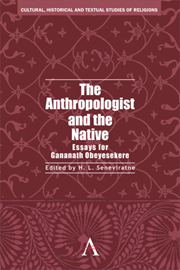Book contents
- Frontmatter
- Contents
- Editor's Note
- The Anthropologist and the Native: Essays for Gananath Obeyesekere
- SECTION I THE INDIAN TRADITION AND ITS REPRESENTATION
- Language and Race in Colonial Representations of Indian Society and Culture
- When the Paramparā Breaks: On Gurus and Students in the Mahābhārata
- The Living and the Dead: Ideology and Social Dynamics of Ancestral Commemoration in India
- On Singularity: What Sanskrit Poeticians Believe to be Real
- SECTION II CASTE, KINSHIP, LAND AND COMMUNITY
- SECTION III RENUNCIATION AND POWER
- SECTION IV BUDDHISM TRANSFORMED
- SECTION V THE ENIGMA OF THE TEXT
- SECTION VI THE ANTHROPOLOGIST AND THE NATIVE
- List of Contributors
The Living and the Dead: Ideology and Social Dynamics of Ancestral Commemoration in India
from SECTION I - THE INDIAN TRADITION AND ITS REPRESENTATION
Published online by Cambridge University Press: 05 May 2012
- Frontmatter
- Contents
- Editor's Note
- The Anthropologist and the Native: Essays for Gananath Obeyesekere
- SECTION I THE INDIAN TRADITION AND ITS REPRESENTATION
- Language and Race in Colonial Representations of Indian Society and Culture
- When the Paramparā Breaks: On Gurus and Students in the Mahābhārata
- The Living and the Dead: Ideology and Social Dynamics of Ancestral Commemoration in India
- On Singularity: What Sanskrit Poeticians Believe to be Real
- SECTION II CASTE, KINSHIP, LAND AND COMMUNITY
- SECTION III RENUNCIATION AND POWER
- SECTION IV BUDDHISM TRANSFORMED
- SECTION V THE ENIGMA OF THE TEXT
- SECTION VI THE ANTHROPOLOGIST AND THE NATIVE
- List of Contributors
Summary
The ritual commemoration of deceased ancestors is one of the prominent features of the religious traditions of India, in particular the Brahmanical tradition. These ritual commemorations are performed at regular times and involve the offering of food and drink to the ancestors. These rites are called śrāddha, and the ancient Indian legal texts devote a considerable amount of space to their description. This brief paper focuses on three areas of śrāddha: 1. behavior and ritual toward ancestors, 2. conflicts and accommodations between ideologies and practices, and 3. social and economic implications of ancestral rites.
1. Two major questions face students of religious behavior toward deceased relatives. First, who is an ancestor? Second, what is the exact nature of the rituals directed at ancestors?
It is obvious that an ancestor is dead relative. Not all dead relatives, however, are ritually considered ancestors. It is clear that death and kinship, although necessary, are of themselves not sufficient conditions for becoming an ancestor (Newell 1976: 2-9). Ancestorhood establishes a ritual relationship between the living and the dead, a relationship that has significant religious, social, economic, and legal implications. At the outset, then, I want to examine the process which establishes this ritual relationship within the mainstream of Brahmanism.
The Sanskrit term for ancestor is pitṛ, which literally means ‘father’. The term, especially in the plural pitaraḥ, may indicate a class of beings who are regarded as the earliest mythical forefathers of the human race.
- Type
- Chapter
- Information
- The Anthropologist and the NativeEssays for Gananath Obeyesekere, pp. 65 - 74Publisher: Anthem PressPrint publication year: 2011



